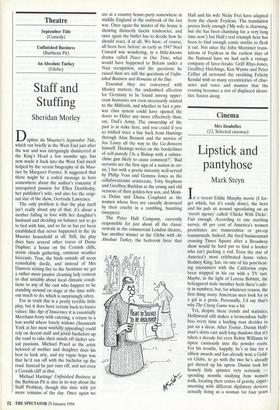Theatre
September Tide (Comedy) Unfinished Business (Barbican Pit) An Absolute Turkey (Globe)
Staff and Stuffing
Sheridan Morley
Daphne du Maurier's September Tide, which ran briefly in the West End just after the war and was intriguingly disinterred at the King's Head a few months ago, has now made it back into the West End much helped by the recent biography of du Mau- rier by Margaret Forster. It suggested that there might be a coded message in here somewhere about the author's romantic if unrequited passion for Ellen Doubleday, her publisher's wife, and also for the origi- nal star of the show, Gertrude Lawrence.
The only problem is that the play itself isn't really about any of that: it's about a mother falling in love with her daughter's husband and deciding on balance not to go to bed with him, and so far as has yet been established that never happened in the du Maurier household at all. Still, the play does bare several other traces of Dame Daphne: a house on the Cornish cliffs, storm clouds gathering, ominous weather forecasts. True, the birds outside all seem remarkably docile, and instead of Mrs Danvers setting fire to the furniture we get a rather more passive cleaning lady content to chat amiably about local climatic condi- tions to any of the cast who happen to be standing around on stage at the time with- mg much to do, which is surprisingly often.
For in truth this is a pretty terrible little play, but it does have certain back-to-basics values: like Age of Innocence it is essentially Merchant-Ivory with catering, a return to a lost world where lonely widows (Susannah York at her most wistfully appealing) could rely on decent staff and jovial bachelors up the road to take their minds off darker sex- ual passions. Michael Praed as the artist beloved of mother and daughter does his best to look arty, and my vague hope was that he'd run off with the bachelor up the road. Instead he just runs off, and not even a Cornish cliff at that.
Michael Hastings' Unfinished Business at the Barbican Pit is also in its way about the Staff Problem, though this time with yet more remains of the day. Once again we are at a country house-party somewhere in middle England at the outbreak of the last war. Once again the master of the house is showing distinctly fascist tendencies, and once again the butler has to decide how he should react, if at all. We have, of course, all been here before: as early as 1947 Noel Coward was wondering, in a little-known drama called Peace in Our Time, what would have happened to Britain under a Nazi occupation, and the questions he raised then are still the questions of Unfin- ished Business and Remains of the Day.
Essential they are concerned with Mosley matters, the undoubted affection for Germany to be found among upper- crust hostesses not even necessarily related to the Mitfords, and whether in fact a pre- war class system could have opened the doors to Hitler any more effectively than, say, Dad's Army. The ownership of the past is at stake here, and you could if you so wished trace a line back from Hastings through Alan Bennett and the movies of Joe Losey all the way to the Go-Between himself. Hastings writes on the borderlines of self-parody (Is a Bishop with a subma- chine gun likely to cause comment?'; 'Bad servants are the first sign of a nation in cri- sis,') but with a poetic intensity well-served by Philip Voss and Gemma Jones as the collaborationist aristocrats, Toby Stephens and Geoffrey Bayldon as the young and old versions of their golden-boy son, and Moni- ca Dolan and Diana Coupland as the women whose lives are casually destroyed by their cruelty in a rambling, haunting timepiece.
The Peter Hall Company, currently responsible for just about all the classic revivals in the commercial London theatre, has another winner at the Globe with An Absolute Turkey, the bedroom farce that
Hall and his wife Nicky Frei have adapted from the classic Feydeau. The translation proves lively enough (`My wife is charming, but she has been charming for a very long time now') but Hall's real triumph here has been to find enough comic misfits to flesh it out. Not since the John Mortimer trans- lations of Feydeau in the earliest days of the National have we had such a vintage company of farce-freaks: Griff Rhys-Jones, Geoffrey Hutchings, Ken Wynne and Peter Cellier all surround the ravishing Felicity Kendal with so many eccentricities of char- acter and voice and manner that the evening becomes a riot of displaced identi- ties: hasten along.


































































 Previous page
Previous page